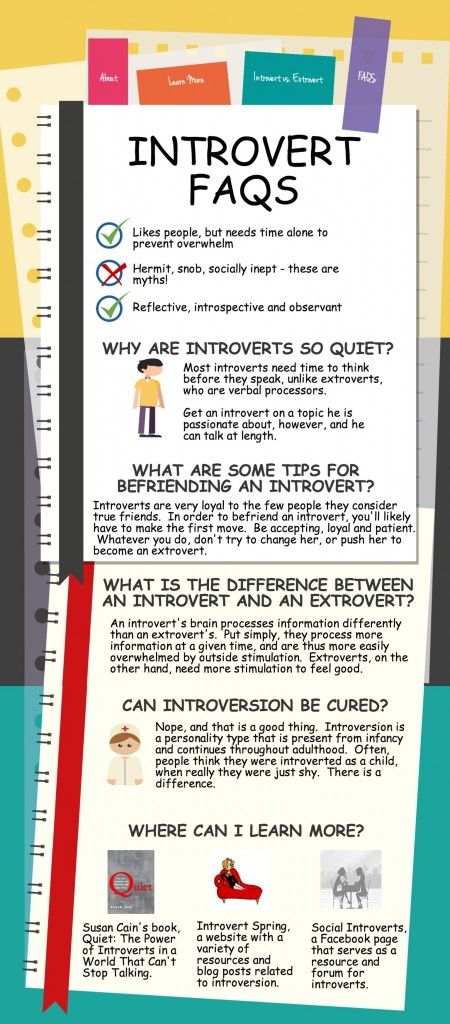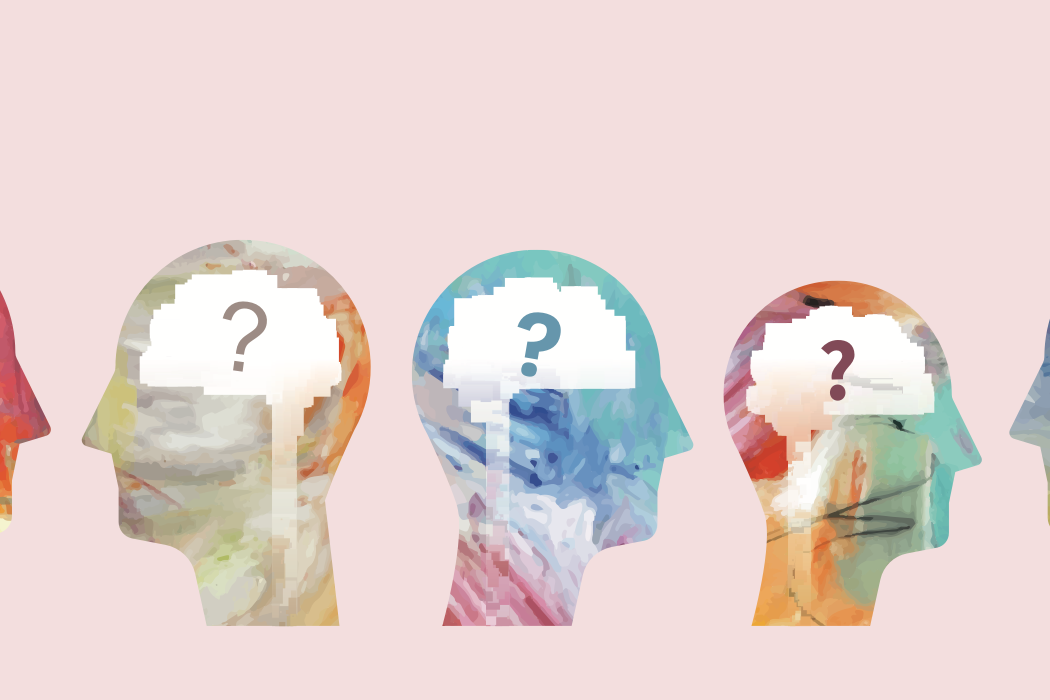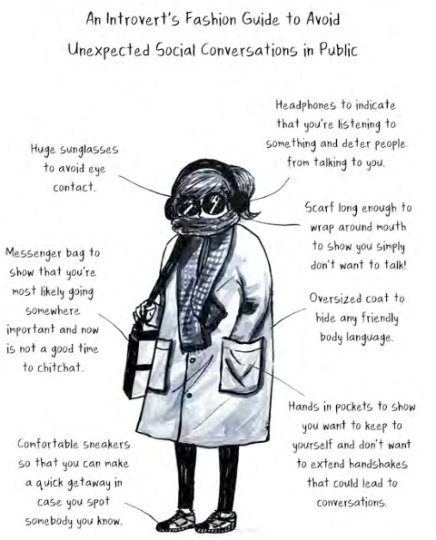10 things about introverts
10 Interesting Facts About Introverts
By: Catherine Huang
Roughly one third to half of the world’s population is made up of introverts. Introversion is commonly misunderstood today with many stereotypes and myths surrounding it. Luckily, however, with the help of the ever-evolving fields of science and technology, there has been a lot of research done that justifies introverts’ tendencies, habits, and needs. Psych3Go shares with you 10 interesting facts about introversion:
1. There are 4 types of introverts.
Researcher Jonathan Cheek states that it’s impossible for there to only be one type of introvert out there. He surveyed roughly 500 participants, ranging from the ages of 18-70 and asked them questions pertaining to how much solitude they need and how often they daydream.
From the answers he gathered, Cheek created a model that spells the acronym STAR that explains the four different types of introverts that exist:
Social: Social introversion is what is commonly accepted and understood as being the archetypal definition of introversion. People who identify as social introverts prefer small groups over large ones, or may prefer solitude altogether. According to Cheek, they like to stay at home with a book or computer, or hang out with close friends instead of going to parties with many unfamiliar faces. It’s different, however, from shyness, because there’s no anxiety attached to their driven needs of solitude.
Thinking: Thinking introversion is one of the newer concepts of introversion today. People who identify as thinking introverts are introspective, thoughtful, and self-reflective. Unlike social introverts, they don’t have a strong need to stray from large social scenes. They’re often avid daydreamers with rich imaginations and a high capacity for creativity.
Anxious: Anxious introverts seek time to be alone, because they often feel awkward and self-conscious. Unlike social introverts, anxious introverts experience painful shyness when they’re around new people. The anxiety doesn’t necessarily go away either when they’re alone because they let things play over and over again in their heads over what could’ve gone or went wrong.
Restrained: People who identify as restrained introverts function on a slower pace and prefer to think before they speak and act. They are also known for being reserved. Restrained introverts take time to get things going, because they don’t let impulse affect their decision-making.
2. Introverts react quickly to new information, but are slower to monitor change.
According to Australian psychologist John Brebner, the brains of introverts create more excitation in the phase of stimulus analysis when situations call for them to analyze what is required of them to do next. For instance, when a phone rings, introverts generate more excitation in their brains; whereas, extroverts need to inhibit everything else going on in their heads in order to make a decision. When an introvert needs to prepare for action, however, they may hesitate longer to pick up the phone. An extrovert, on the other hand, answers the phone right away. While introverts are quick to reacting strongly to new situations, extroverts, in contrast, are quicker to register changes.
For instance, when a phone rings, introverts generate more excitation in their brains; whereas, extroverts need to inhibit everything else going on in their heads in order to make a decision. When an introvert needs to prepare for action, however, they may hesitate longer to pick up the phone. An extrovert, on the other hand, answers the phone right away. While introverts are quick to reacting strongly to new situations, extroverts, in contrast, are quicker to register changes.
3. Introverts dread small talk.
Psychologist Laurie Helgoe, author of Introvert Power: Why Your Inner Life Is Your Hidden Strength, states that small talk blocks honest interaction. Introverts might come off as being disinterested in others, because they don’t like taking part in small talk. But, they only dread it because of the barriers it creates between them and others. Introverts want to feel connected; however, they prefer to make connections through authenticity. Deep and meaningful conversations are what they often crave for that help lower the walls.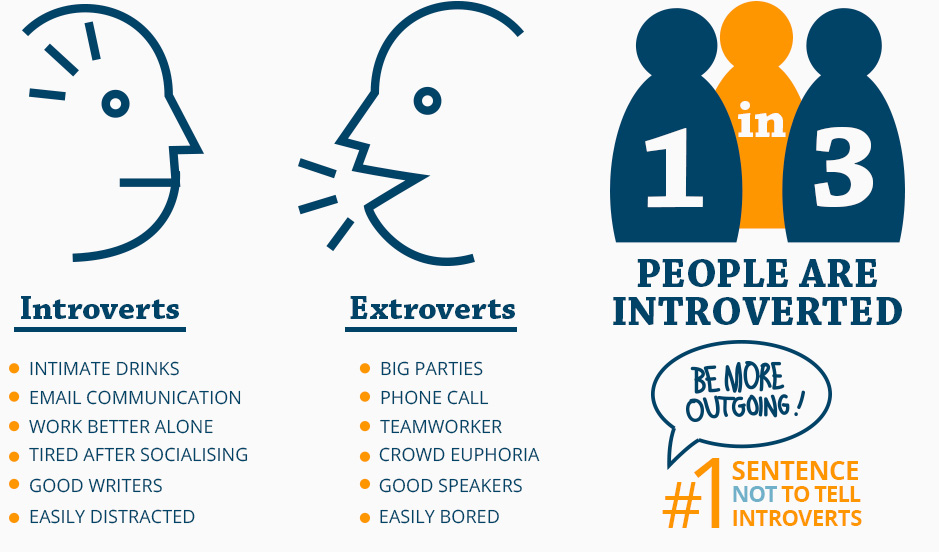
4. Introverts need alone time.
This goes back to fact #1 for individuals who strongly identify as social introverts. According to research, the reason introverts need alone time is because they respond differently than extroverts do to rewards. Rewards include food, money, sex, and social status. Although introverts do care about eating, the income that they earn, and cultivating relationships with others, they are less driven and experience less enthusiasm for the possibilities of them. Extroverts, in contrast, are more energized by working for those rewards, which is why they are also prone to instant gratification more often than introverts.
5. Introverts aren’t risk-averse, but they are more careful and calculated about what risks they choose to take.
This is due to the biological makeup of the brain. Dopamine is a neurotransmitter associated with sensation-seeking, risks, and new adventures. According to research, there is a difference of dopamine activity in the brains of introverts compared to those of extroverts.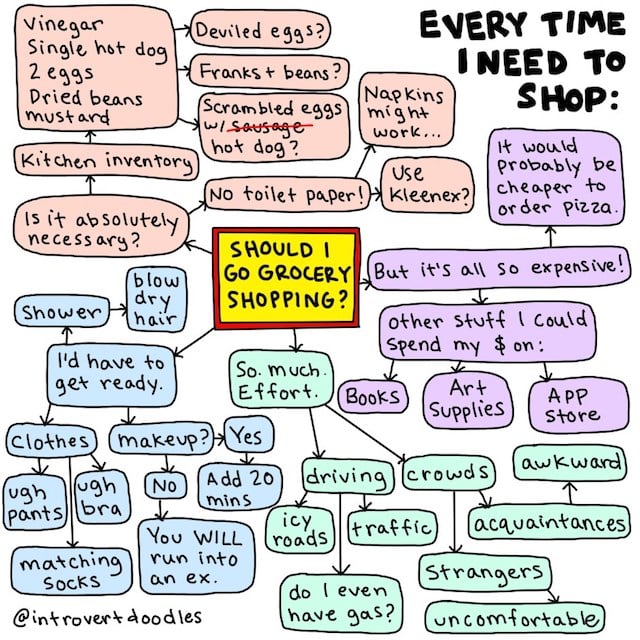 This isn’t because introverts have less dopamine in their brains than extroverts. Both have the same amount. However, introverts use less activity from the region of their brain that generates dopamine.
This isn’t because introverts have less dopamine in their brains than extroverts. Both have the same amount. However, introverts use less activity from the region of their brain that generates dopamine.
6. Introverts are deep thinkers.
This goes back to fact #1 for individuals who strongly identify as thinking introverts. Since introverts use less activity from dopamine, they rely more often on a neurotransmitter called acetylcholine. Acetylcholine, just like dopamine, is linked to pleasure. The difference, however, lies in pleasure that is produced from turning inwards. This allows the individual to ponder and reflect deeply, and focus on one task with great attention for an extended period of time. Acetylcholine also influences one to prefer calm, quiet settings over loud, crowded places.
7. Introverts are more creative.
Introverts need solitude to recharge, but it is also within solitude that they find creativity. Psychologist Mihaly Csikszentmihalyi discovered that teenagers who have a hard time being alone were less likely to develop their creative skills.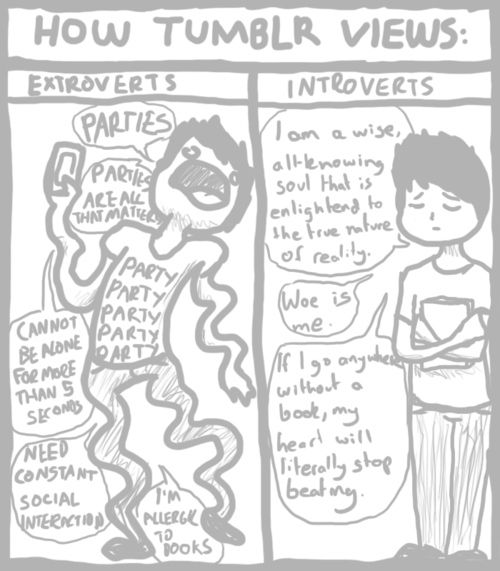 Most artists and writers who identify as introverts do their best work when they’re by themselves as opposed to working in group settings. Researcher Reed Larson also found that adolescents feel less self-conscious when they’re alone; therefore, it helps individuals feel safe taking more risks that allows their creative juices to flow.
Most artists and writers who identify as introverts do their best work when they’re by themselves as opposed to working in group settings. Researcher Reed Larson also found that adolescents feel less self-conscious when they’re alone; therefore, it helps individuals feel safe taking more risks that allows their creative juices to flow.
8. Introverts like the rain.
Rain creates white noise that often attracts introverts, because of the opportunities it brings to seek solitude. Its calming effect also helps introverts derive pleasure from it as they can turn inwards and escape within themselves for the time being. Rain helps lower expectations for the day and isn’t as overstimulating as other weather days with the overbearing sun.
9. Pretending to be extroverted for introverts can affect their performance negatively.
Researchers discovered that introverted participants who act extroverted have showed slower reaction times on cognitive tests than introverts who were allowed to be themselves.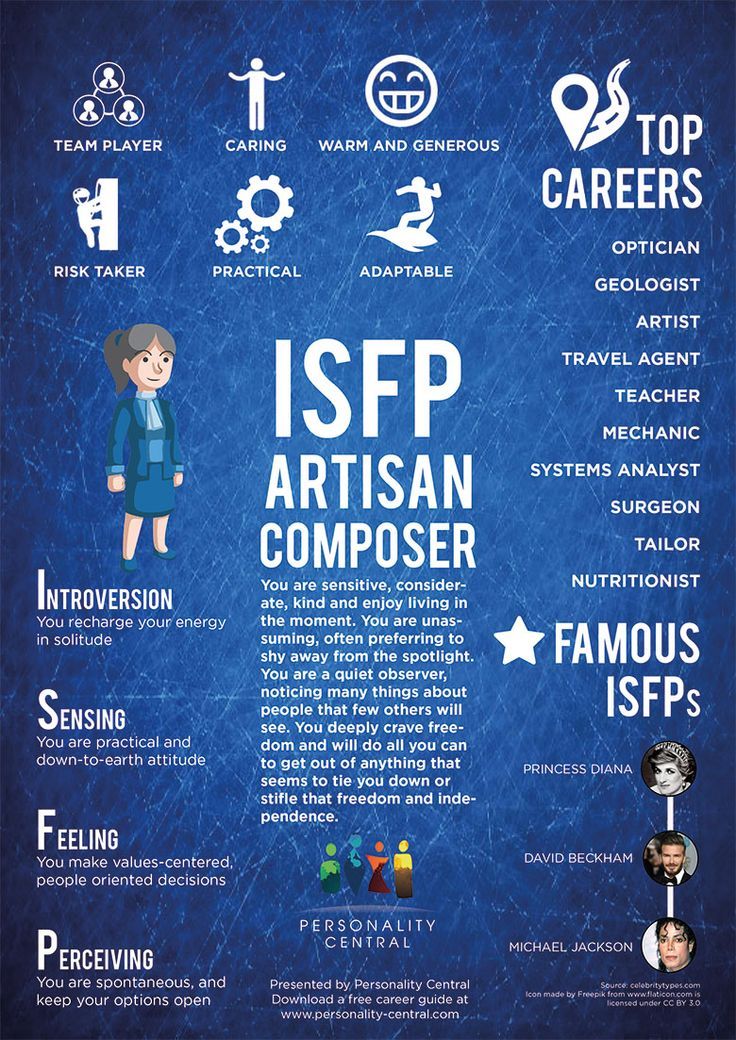 This is because the time introverts spend on pretending to be the people they aren’t naturally wired to be causes depletion that distracts and disrupts their usual ways of performance. It’s important to realize and acknowledge this, since the world is so used to trying to mold introverts into becoming extroverts.
This is because the time introverts spend on pretending to be the people they aren’t naturally wired to be causes depletion that distracts and disrupts their usual ways of performance. It’s important to realize and acknowledge this, since the world is so used to trying to mold introverts into becoming extroverts.
10. Happiness might not be a top priority for introverts, and it’s actually okay.
Sounds strange, right? Especially when we live in a culture that emphasizes happiness so much. But, according to psychologist Maya Tamir of Boston College, introverts prefer to maintain a neutral emotional state when presented with tasks, such as taking a test, giving a speech, or thinking rationally. This is because happiness, an arousing emotion, may cause introverts to feel distracted that get in their way of performing those tasks efficiently. Extroverts, however, prefer happiness when completing such tasks because it acts as a motivator.
References:
Cooper, B.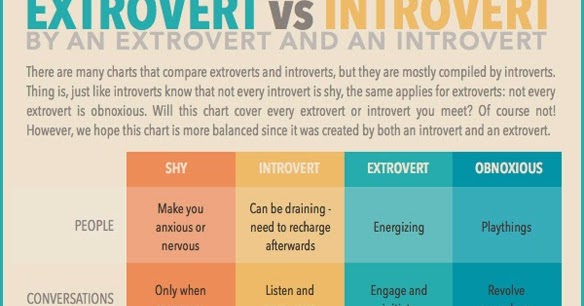 (2016, March 30). What Creative People Understand About the Importance of Being Alone. Quartz. Retrieved September 14, 2017.
(2016, March 30). What Creative People Understand About the Importance of Being Alone. Quartz. Retrieved September 14, 2017.
Dahl, M. (2015, June 25). So Apparently There Are 4 Kinds of Introversion. NY Mag. Retrieved September 14, 2017.
Granneman, J. (2016, January 13). The Real Reason Introverts Dread Small Talk. Huffington Post. Retrieved September 14, 2017.
Granneman, J. (2016, August 13). This Is the Scientific Explanation for Why Introverts Like Being Alone. Retrieved September 14, 2017.
Granneman, J. (2017). Why Introverts and Extroverts Are Different: The Science. Retrieved September 14, 2017.
Helgoe, L. (2010, September 1). Revenge of the Introvert. Psychology Today. Retrieved September 14, 2017.
P&Q. (2017, January 6). Why Introverts Like the Rain. Retrieved September 14, 2017.
Whitbourne, S. (2013, July 9). An In-Depth Look at How Introverts Think. Psychology Today. Retrieved September 14, 2017.
10 Great Things about Being an Introvert
As an introvert, you have lots of advantages in life. Granted, you may not feel that way when you're forced to make small talk with strangers at an inane social event, but you really do possess enviable qualities. This article takes a quick look at just a handful of them.
You're comfortable being a party of one
Extroverts like to travel in flocks, and they have a hard time enjoying movies, theater plays, or restaurant meals unless they have company. You, on the other hand, can happily read a book at a café, watch the latest blockbuster at a movie theater, or attend a Broadway show all by yourself.
Likewise, an extrovert who's home alone for a long stretch is a sad, sad creature. But if you're an introvert who's on your own, you can find endless ways to entertain yourself. All you need is a book to read, a video to watch, an interesting recipe, or an antique table to refinish, and you can amuse yourself for hours without even noticing that no one else is there.
You can stop and smell the roses
Extroverts tend to hop quickly from one activity to another. On the upside, this means that they have lots and lots of fun experiences. But on the downside, it means that they sometimes miss out on life's quieter pleasures.
If you're an introvert, on the other hand, you tend to think more deeply and move a little more slowly. And that allows you to admire a spider's web, contemplate a poem, or even take a little time to smell that rose.
You have amazing friends
Extroverts usually have a very wide circle of friends. However many of the people they count as friends are really just casual acquaintances.
You, on the other hand, tend to form deep, strong bonds with a few carefully selected people. As a result, you create long-lasting relationships with friends who adore you — even if you never return their phone calls.
You look before you leap
Extroverts often rush optimistically into the unknown. But as a deep-thinking introvert, you're big on facts. So before you jump into a new adventure — whether it's starting your own business, getting married, or moving to a new city — you do your research. And that means you'll probably say "oops" a lot less often than your extroverted friends.
But as a deep-thinking introvert, you're big on facts. So before you jump into a new adventure — whether it's starting your own business, getting married, or moving to a new city — you do your research. And that means you'll probably say "oops" a lot less often than your extroverted friends.
You can be the calm in the center of the storm
When things get crazy at work, the fur can really fly. Missed deadlines, high-pressure projects, and cost overruns can make everyone crazy, and that kind of stress can turn meetings into shouting matches.
When tempers are short, you're in a good position to calm things down. That's because rather than jumping in and yelling, you're likely to sit back and analyze the situation. As a result, you can often suggest smart solutions or wise compromises — as long as you can overcome your introverted reluctance to speak up.
You're a dreamer
As an introvert, you turn inward for energy instead of turning outward, which makes you prone to daydreaming. And often, that's a good thing!
And often, that's a good thing!
It's true, of course, that too much daydreaming can be a problem (especially if the boss calls on you in a meeting). In fact, it's easy for you to develop "introvert ADD," which can cause trouble at work and at home. So you don't want to spend too much of your day in la-la land.
However, daydreaming can also unleash your creativity and help you think outside the box. In fact, some of the greatest books, poems, and physics theories of all time have come from daydreaming introverts. So dream on.
You really know your stuff
A friend of mine once went to a lecture at a zoo given by a quiet but enthusiastic entomologist. Afterward, I asked how it went. "Wow," my friend replied, "that guy sure knows his stink bugs."
Like this bug expert, introverts are often deeply knowledgeable about the topics that interest them. That's because introverts love learning, and they enjoy spending hours gathering facts. So no matter what topic fascinates you — whether it's Moroccan cooking, steam engines, or stink bugs — other people are likely to view you with respect as an authority.
You don't need a babysitter
Smart managers love introverted employees. Why? Because introverts don't require helicopter managers who'll hover over them. Unlike extroverts, who need frequent attention and praise like flowers need sunshine, an introvert mainly desires peace and quiet, long stretches of uninterrupted time, and just an occasional word of encouragement.
You can avoid the parking lot crush
At the end of any event — such as a conference, a workshop, a wedding — most people tend to hang around chatting. You, however, probably sit right by the doorway so you can beat feet as soon as things wrap up. As a result, you're likely to be halfway home before the rest of the crowd starts putting their keys in their ignitions.
You intrigue people
It's true! One of the most common comments that people make about introverts is that they're enigmatic or mysterious. And that's kind of cool, isn't it?
Why do many introverts come across as mysterious? One reason is that they don't say much, so people have to guess what they're thinking.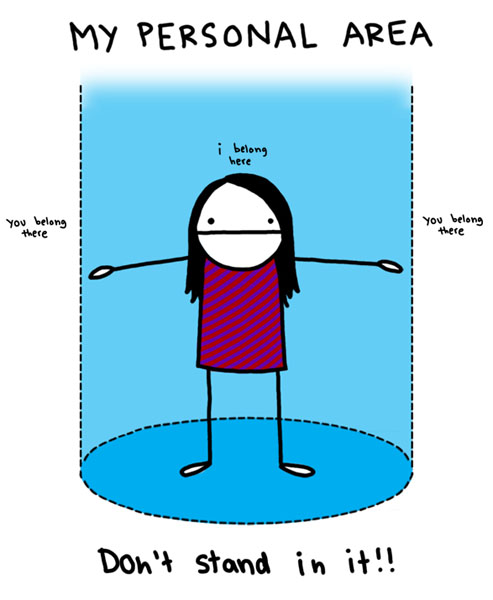 Another is that introverts tend not to show their emotions on their faces. Now, being mysterious can sometimes be a problem if you're an innie. For example, people may think you're being aloof or ignoring them, and you may not communicate what you need from them. (It is possible to be too enigmatic.) But other times, being quietly mysterious works to your advantage because it can make people think you're hiding intriguing secrets when you're really just thinking about something mundane, like whether you remembered to buy laundry detergent the last time you were at the store.
Another is that introverts tend not to show their emotions on their faces. Now, being mysterious can sometimes be a problem if you're an innie. For example, people may think you're being aloof or ignoring them, and you may not communicate what you need from them. (It is possible to be too enigmatic.) But other times, being quietly mysterious works to your advantage because it can make people think you're hiding intriguing secrets when you're really just thinking about something mundane, like whether you remembered to buy laundry detergent the last time you were at the store.
10 Facts About Introverts - FOODIKA Online Magazine
Introvert - is focused on his inner world. He is distinguished by unsociableness, isolation and passivity. However, it is introverts who have a great and stubborn perseverance in achieving their goal, a tendency to introspection. An introvert loves order in everything, it is difficult for him to be guided by a sudden impulse.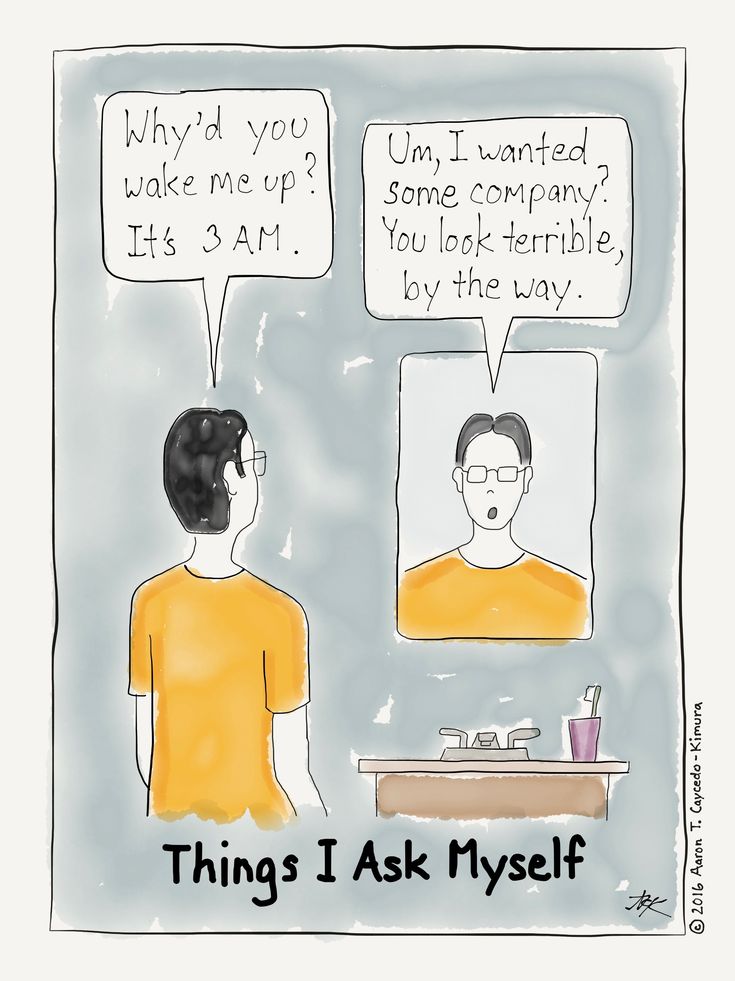 It is extremely difficult for such people to adapt to a new team. They speak slowly, most often they are either in a bad mood or in a neutral one. An introvert gives the impression of a calm person, he is open only to a close and select circle. He perfectly controls his feelings, and it is very difficult to piss him off.
It is extremely difficult for such people to adapt to a new team. They speak slowly, most often they are either in a bad mood or in a neutral one. An introvert gives the impression of a calm person, he is open only to a close and select circle. He perfectly controls his feelings, and it is very difficult to piss him off.
Introverts are lonely and less likely to feel lonely
An introvert is fine on his own. He himself is a wonderful partner, interlocutor, adviser and just a close person. Unfortunately, he is annoyed by the excessive importunity of even loving people, so most often introverts look in a bad mood to others. In fact, they are in their own beautiful world, similar to a computer game that he plays alone.
Introverts like to be at home
An introvert is not interested in crowded places. For them, it is psychologically unsafe. According to the introvert, some unceremoniously invade personal space and claim attention.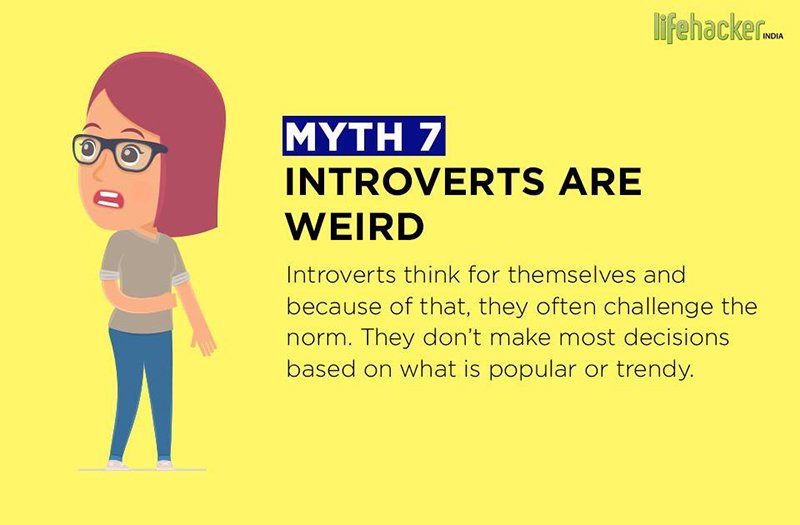 And an introvert is not ready to distribute his exclusive attention to everyone. It is an introvert who, if desired, can be sensitive and understanding, but not with everyone, he decides who suits him for such exclusive joys, and whom he is ready to make happy.
And an introvert is not ready to distribute his exclusive attention to everyone. It is an introvert who, if desired, can be sensitive and understanding, but not with everyone, he decides who suits him for such exclusive joys, and whom he is ready to make happy.
Introverts first think, then speak
Introverts don't just think, they are constantly in the process of thinking. The endless analysis and restructuring of preliminary scenarios allows them to reduce their personal anxiety. Unfortunately, for those who want to be around introverts, this is extremely difficult, because you have to constantly adapt to it, and the usual manifestations of attention do not work. The best thing for an introvert is when you are in the field of view, but do not interfere or violate his personal boundaries.
Introverts like to analyze (sometimes too much)
What is the analysis of an introvert? Such a person builds causal relationships, makes a large number of conclusions, thanks to which he builds a behavioral strategy.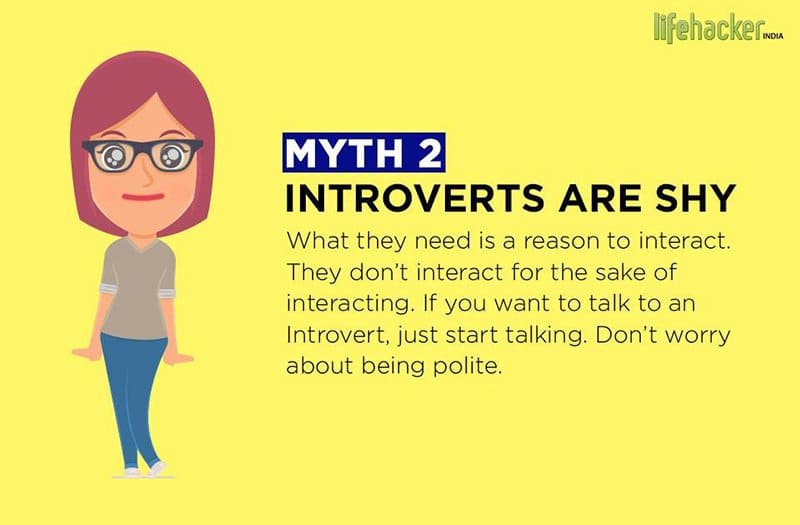 Unfortunately, his analysis, especially the analysis of emotions, is not always close to the real situation, because in his analysis the introvert is more in personal illusions than collects real facts. It is important for an introvert to collect more information for the clarity of analysis, which means that it is worth going beyond your capabilities and entering the zone of discomfort in order to develop.
Unfortunately, his analysis, especially the analysis of emotions, is not always close to the real situation, because in his analysis the introvert is more in personal illusions than collects real facts. It is important for an introvert to collect more information for the clarity of analysis, which means that it is worth going beyond your capabilities and entering the zone of discomfort in order to develop.
Introverts do not like spotlights (spotlight)
No intrusion, search in his inner personality zones, the introvert will not allow. If your man is an introvert, but you still got into his phone ... you won’t find anything but toys and newfangled applications there. But it is this act of yours that will destroy the trust between you forever. And an introvert, if he finds out about this, will leave you without explanation. The same applies to his cabinets, his desk, he has his own order everywhere and you can break the atmosphere that he created and what is his true charm of the moment and situation.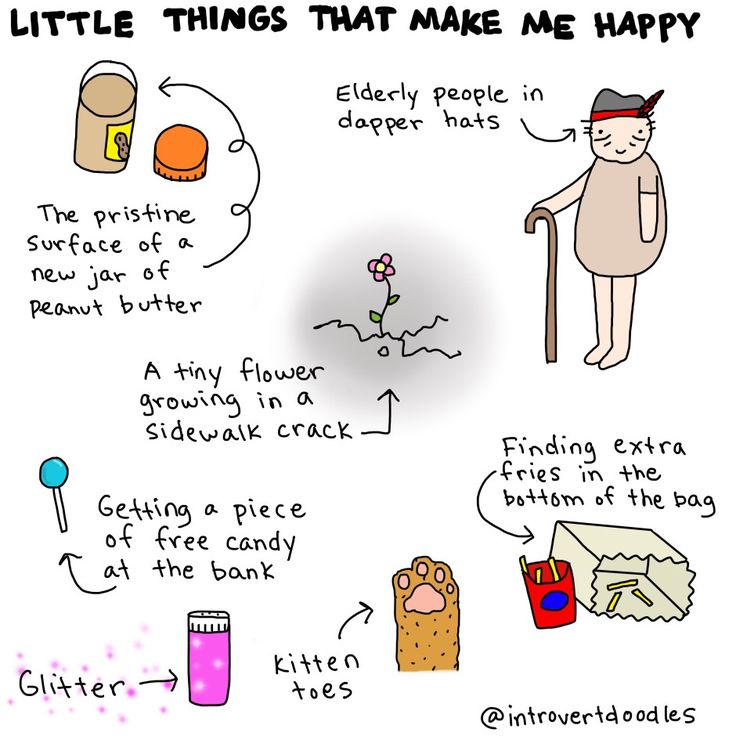
Communication can be too much of an ordeal for an introvert
If an introvert is forced to interact, you will end up with a withdrawn, disconnected, perhaps even rude person around. An introvert has a hard time with public speaking, mass gatherings and all sorts of evenings where you need to communicate. The main reason is that they feel defenseless in such a situation. And their strange reaction, rudeness, is only a protective mental mechanism.
Introverts are not antisocial
Introverts are not sociopaths. If they let you into their magical and creative world, be prepared for the fact that its inner illusion is very beautiful and exciting. In this fairy tale there is a place for both parents and a close friend, or girlfriend, love, devotion and fidelity. Introverts, if they fall in love, it is difficult to switch to new characters. After all, if once they let you in close, it means that you are exceptional, because he checked and analyzed your thoughts, feelings and behaviors for a long time.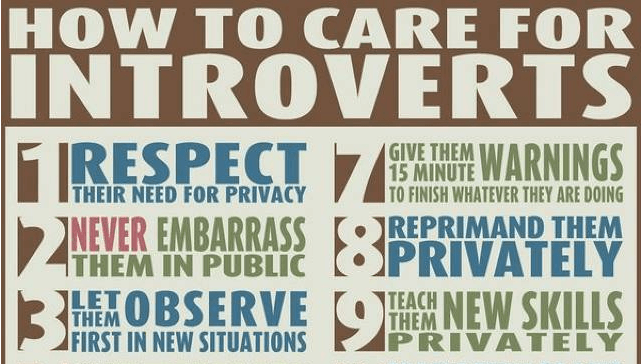
Introverts prefer communication only with introverts
Introverts do not understand sharp, impetuous and impulsive extroverts. Absolutely opposite, they seem to speak different languages. It is difficult for them to interact, because only a true introvert is able to understand the whole depth of the inner world of an introvert.
Introverts pay a lot of attention to small things
Fixation on details allows them to be very attentive, think in schemes and focus on small things. It is these qualities that allow them to achieve excellent results in the professional field. A penchant for exact sciences and programming helps them to be in a different reality, even at work.
Introverts conquer the world (despite the fact that they like to stay at home, etc., they easily agree to challenges and are ready for everything new).
Interest in novelty, discovery of something new, the introvert is elevated and made out of some significant and extremely successful people. Many achievements in science and technology, programming, biological discoveries are associated with introverts. Because such complex, at first glance, people are ready for great achievements in stressful situations. The situation of stress and necessity triggers an unusual mental mechanism that reveals the creativity and creativity of an introvert to the fullest ... and it is introverted individuals who can conquer the whole world.
Many achievements in science and technology, programming, biological discoveries are associated with introverts. Because such complex, at first glance, people are ready for great achievements in stressful situations. The situation of stress and necessity triggers an unusual mental mechanism that reveals the creativity and creativity of an introvert to the fullest ... and it is introverted individuals who can conquer the whole world.
[author title=" Anna Sukhova » image="http://foodika.ru/wp-content/uploads/2016/07/anna-syxova.png"] Psychologist, psychodiagnostician, coach, NLP specialist, founder club "Psychology of Happiness"[/author]
9 facts about introverts - CityDog.io
If a person admits to you that he is an introvert, do not rush to disbelieve and exclaim: "Come on!" Perhaps you can’t even imagine how much internal strength it took him to perform with an incendiary stand-up.
1
There are no absolute introverts and extroverts
View this post on Instagram (@slovarnyyzapas_world) on
Jonathan Chick) added four more types (but, as with any typology, keep in mind that there are practically no absolute manifestations of one type, and every person is another vinaigrette).
Social introverts can be chatty, laugh out loud at parties, but they still don't really like the crowd, and they are really ready to open up only to the closest people. If you can stay at home for a long time, try to work alone and go on vacation to some place that is not too crowded - you are a social introvert!
Thinking introverts can remain immersed in themselves for a long time and analyze their own emotions. They have developed intuition and empathy. Sometimes you get too carried away inventing situations inside your head and imagine how you are chatting with Johnny Depp? That way!
Anxious introverts are really afraid of other people and feel uncomfortable in society, because they are not confident in themselves, they get very upset at any failure, and even in a circle of friends they can feel out of place.
Restrained introverts cannot act until everything is thoroughly considered - they do not like to take risks. These people do not get up immediately in the morning with an alarm clock, but lie in bed for some time and come to their senses.
2
Introverted leaders are more successful because they allow subordinates to realize ideas
Most introverts try to break themselves because society requires you to be outgoing. Susan Cain did the same for most of her life, until she realized that this was not only her personal loss, but also a loss for the whole world.
We need introverts when it comes to creativity and leadership. Extroverts perform better with more stimuli, while introverts do the opposite. But just as the larks agreed and pushed the owls aside, it happened with a couple of extroverts - introverts: many schools (but not in the Soviet system) and workplaces are built in such a way as not to be convenient for introverts. However, most teachers describe the ideal student as an extrovert - despite the fact that introverts learn better.
However, most teachers describe the ideal student as an extrovert - despite the fact that introverts learn better.
What if you're not a night owl or a lark? Read about the new chronotype system!
3
Loneliness is the main component of creativity
View this post on Instagram (@psychology_of_the_soul) on
This idea was proclaimed by the same Susan Cain: it is impossible to be in society and not mirror the opinions of the people with whom you communicate. And the group almost always follows the opinion of the most dominant character in the room, regardless of the value of his ideas.
Western society now prefers a person who acts to a person who contemplates and sets an example of successful traders for everyone, but is it necessary to be like that? If you want a burst of creativity, go to the woods and spend time alone with nature - works not only for introverts.
4
Happiness is not a priority for introverts
View this post on Instagram0160 May 14, 2019 at 12:05am PDT
They prefer a neutral emotional state. Happiness can spur extroverts into action, but for introverts it can be distracting and prevent them from completing important tasks.
There seems to be an explanation for this from the point of view of body chemistry: introverts are much less subject to dopamine races, that is, they are less amenable to the tricks of marketers. Food, money, sex, and social status are not as important to introverts as they are to extroverts. They don't work for a reward. 92
View this post on Instagram
A post shared by HR inspire Workshop (@hr_inspire_you) on
All the times when introverts fail to finish the job are due to the fact that they are trying to be extroverts, for example, they go to work in sales. If you are an introvert, do not try to break your nature, this will not help you become more successful.
If you are an introvert, do not try to break your nature, this will not help you become more successful.
8
They are not snobs and not closed
View this post on Instagram
A Post Shared by Tanya Santos-Jouubert (@tanyasantos920) on
And not shy. Yes, introverts don't like small talk - not because they hate people, but because they don't want to waste energy exchanging a set of conventions that only alienates us from each other.
Introverts prefer to get closer during a conversation rather than vice versa. They don't like to pretend, so if you get close enough to an introvert and get his love, be sure that he doesn't fake his location. If you play up and lie to an introvert, you will quickly lose credibility.
Introverts are ready to do anything for the "right" people in their lives - those with whom they feel comfortable. In the right company, they bloom and glow.
In the right company, they bloom and glow.
By the way, if it is necessary at a party or presentation, they can inspire with speeches, flex and laugh fervently, without saying a word that the crowd is a burden to them. Many introverts are very empathic, that is, they "collect" the emotions of those around them.
9
Please don't distract the introvert. And don't make me angry
A post shared by Anna (@tiptop.anny) on
into the flow, but if you distract them, they will spend a lot of energy getting back into the workflow, and less energy will go to the project itself. Open space is not recommended.
In situations of conflict, they will try to hide their anger, so it is very difficult to understand that an introvert is angry with you. If you are not careful, then you can invite a real storm - if you bring this person to the point, he will give you a thorough thrashing.